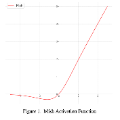Activation sparsity refers to the existence of considerable weakly-contributed elements among activation outputs. As a prevalent property of the models using the ReLU activation function, activation sparsity has been proven a promising paradigm to boost model inference efficiency. Nevertheless, most large language models (LLMs) adopt activation functions without intrinsic activation sparsity (e.g., GELU and Swish). Some recent efforts have explored introducing ReLU or its variants as the substitutive activation function to help LLMs achieve activation sparsity and inference acceleration, but few can simultaneously obtain high sparsity and comparable model performance. This paper introduces a simple and effective sparsification method named "ProSparse" to push LLMs for higher activation sparsity while maintaining comparable performance. Specifically, after substituting the activation function of LLMs with ReLU, ProSparse adopts progressive sparsity regularization with a factor smoothly increasing along the multi-stage sine curves. This can enhance activation sparsity and mitigate performance degradation by avoiding radical shifts in activation distributions. With ProSparse, we obtain high sparsity of 89.32% for LLaMA2-7B, 88.80% for LLaMA2-13B, and 87.89% for end-size MiniCPM-1B, respectively, achieving comparable performance to their original Swish-activated versions. These present the most sparsely activated models among open-source LLaMA versions and competitive end-size models, considerably surpassing ReluLLaMA-7B (66.98%) and ReluLLaMA-13B (71.56%). Our inference acceleration experiments further demonstrate the significant practical acceleration potential of LLMs with higher activation sparsity, obtaining up to 4.52$\times$ inference speedup.
翻译:暂无翻译




